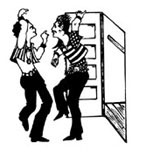
Jack Kerouac’s Creedal Moment
DECLARATION OF HIS CATHOLICISM
It has been called one of the most bizarre panel discussions ever held on television.
Episode 32 of the third season of author and columnist William F. Buckley Jr.’s television talk show Firing Line aired on September 4, 1968. Buckley began by announcing that the episode’s topic would be “the hippies, an understanding of whom we must, I guess, acquire or die painfully.” Buckley’s pain, though not fatal, began soon after his opening monologue. The panel included Beat movement writer Jack Kerouac; sociologist Lewis Yablonsky, author of The Hippie Trip (1968); and poet, musician, and polemicist Ed Sanders.
Buckley, introducing Kerouac, called him a “regular practicing novelist” and referred to his bestselling On the Road (1957) as “seeming to preach a life of disengagement and making a virtue out of restlessness” — an image Kerouac himself would project during the 30 minutes that followed.
Kerouac sat to Buckley’s immediate left. The host, known to lean to the right politically, now physically leaned far-right, anxious to put space between himself and the clearly soused Kerouac. Beat poet Allen Ginsberg, a friend of Kerouac’s who was in the audience, later claimed that when Kerouac arrived at the studio inebriated, Buckley asked him to replace Kerouac on the panel. Ginsberg politely declined.
You May Also Enjoy
The main themes of "The Betrothed" include the mercy and forgiveness of God and the corruption caused by love of wealth and worldliness in society and the Church.
The splashy success of The Vagina Monologues simply requires comment.
We are controlled by numerical systems run amok — creating lists and statistics, SAT scores and Nielsen ratings, Gallup and Harris polls, and the fearsome “bottom line.”

